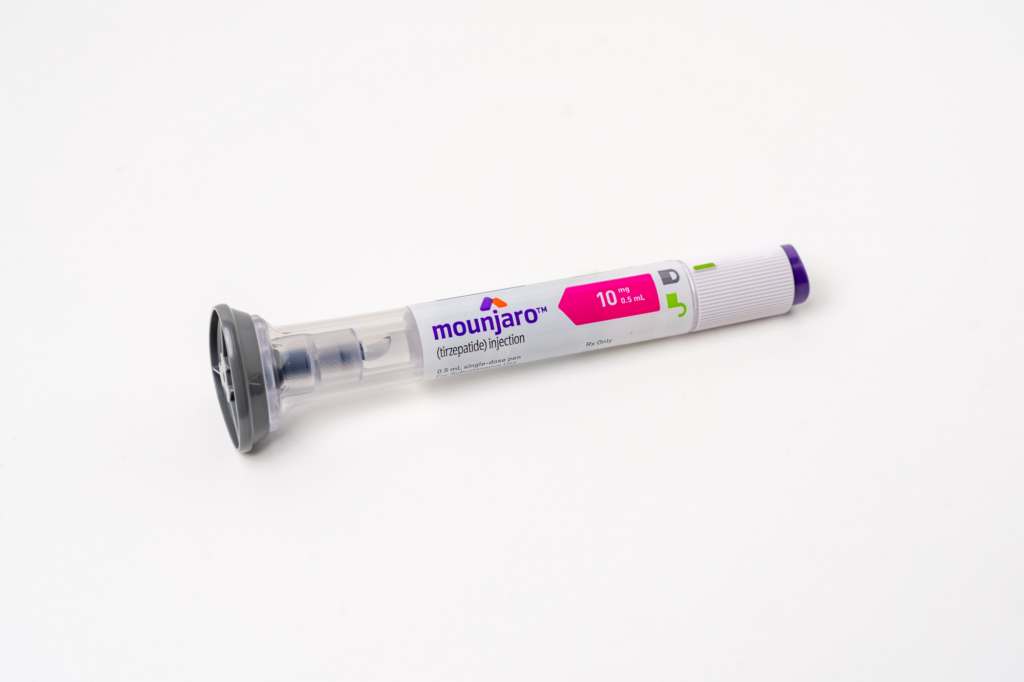In recent years, the pharmaceutical landscape has seen the emergence of glucagon-like peptide-1 (GLP-1) receptor agonists (RAs) such as semaglutide and tirzepatide, offering promising outcomes in weight reduction for those struggling with obesity. Landmark trials demonstrated significant weight loss in obese individuals. In the STEP 1 and STEP 3 trials, participants with a mean BMI of 38 showed around 15% weight loss after 68 weeks’ treatment with 2.4mg semaglutide.1 Similarly, 72 weeks’ treatment with tirzepatide (5, 10 or 15 mg) produced weight loss of 15-21% in the SURMOUNT-1 trial.2 With the subsequent FDA approval of these two GLP-1 RAs for weight management in 2021 and 2023, their popularity has been soaring. But with that popularity comes the question: what to expect if your patients have to stop the medication.
Reasons for Stopping GLP-1 RA Treatment.
Considering obesity is a chronic medical condition, there should be an expectation that it will require lifelong treatment—much like diabetes, hypertension or any other chronic illness. Patients treated with GLP-1 RAs should therefore understand they will need to continue using them long-term. However, that is not the reality: even diabetic patients treated with GLP-1 RAs are more likely to stop them than other second-line anti-diabetic medicines.3 That study didn’t report why 50% of diabetics on GLP-1 RAs discontinued them, but gastrointestinal (GI) adverse events were a suggested cause.3 Adverse events are just one of a number of reasons that people stop using these drugs, as follows.
Adverse events
In the STEP-1 trial, the rate of GI adverse events was 1.5 times higher in the semaglutide group vs. the placebo group (74.2% and 47.9%, respectively), which contributed to a discontinuation rate of 7%.4 In SURMOUNT-1, considerably more tirzepatide than placebo patients experienced GI adverse events, e.g., nausea 30% vs. 10% nausea, diarrhea 30% vs. 7%, and vomiting 10% vs. 2% (in the tirzepatide and placebo groups, respectively).5 More serious GI adverse events have been reported with GLP-1 RAs too, which increase the risk of pancreatitis, bowel obstruction, and gastroparesis.6 In addition, users of these medications have reported other unexpected effects such as alopecia, suicidal ideation, and aspiration, which the FDA is now investigating.7 GI side effects are not only major contributors to stopping GLP-RAs, but are more likely to be reported as such by patients than by their physicians.8
Cost
The high cost of these medications is a barrier to many patients continuing them, with US list prices or $12,000-16,000 per year, and over $6500 a year at maximum discount.9 Furthermore, only around a quarter of health insurers cover GLP-1 RAs for weight loss.10 While there are many sites offering lower-cost versions, there is often concern that they are counterfeit, leading to recent global warnings of this risk.11
Lack of supply
There is a shortage of both semaglutide and tirzepatide due to their unprecedented demand, with both now listed in the FDA Drug Shortages database, allowing for compounded versions to be made (although that does not make such versions FDA-approved).
Needle phobia
Unsurprisingly, many users of subcutaneous GLP-1 RAs find regular injections inconvenient, the injections painful, the needles too large, or they prefer oral medications.8 These are all complaints for which there is a wide disparity between users reporting them and doctors acknowledging them as reasons for discontinuation.8
Goal weight achieved
Patients who achieve their goal weight may no longer wish to continue with their treatments, despite the evidence that rebound weight gain is common.
Poor result
The GLP-1 RAs don’t work for everyone. In the initial semaglutide weight loss trial, 14% of patients lost less than 5% of body weight and 31% lost less than 10%.4 Similarly, in tirzepatide’s SURMOUNT-1 study, 9-15% lost less than 5% and 16-31% loss less than 10% (dose-dependent).5 A number of reasons have been suggested for this lack of efficacy in certain individuals, ranging from genetic mutations causing poor responses to pharmacokinetic differences and concomitant medical conditions.12 Other users describe an initial good result that then plateaus off relatively quickly.12 Whether initial or subsequent ‘failures’, such patients are likely to stop the medications because they are ineffective.
Consequences of GLP-1 RA Discontinuation
Rebound weight gain
As one successful user of tirzepatide noted after he discontinued it, “What happens next is a new frontier”.13 But there is much evidence that the most obvious consequence is weight gain. In STEP 4, the extension of the STEP 1 trial of semaglutide, placebo patients regained around half their prior weight after a year.14 Similarly, in a continuation of the SURMOUNT-1 study of tirzepatide, patients gained back over half the weight they’d previously lost.15 In both these extensions, lifestyle interventions such as reduced calorie diets and exercise advice continued. In a further semaglutide trial that did not continue these measures, patients gained back even more weight: two-thirds of their previous loss.16
There may be a parallel to testosterone replacement therapy (TRT) with GLP-1 RA medications. It has long been known that TRT suppresses natural testosterone production through a negative feedback loop that suppresses natural gonadotrophin production.17 Could there be a similar effect from semaglutide and tirzepatide? While a negative feedback loop has not been identified, the very high levels of these medications not only ‘flood’ the body, but do so for extended periods, unlike endogenous GLP-1, which normally fluctuates in response to eating. It’s therefore not unreasonable to hypothesize that these medications suppress endogenous GLP-1 production. If that’s true, then stopping GLP-1 RAs would deliver a ‘double whammy’: the agent causing increased satiety (and subsequent weight loss) has gone and the body’s normal GLP-1 response to eating is also suppressed.
Psychological issues
It’s not surprising that those who start these medications may be anxious about stopping them. In addition, patients may encounter emotional challenges, such as disappointment or frustration, upon discontinuing weight loss medications and subsequently regaining previously lost weight.
Strategies for Managing Post-Discontinuation Effects
Knowing that a relatively large proportion of patients are likely to stop their GLP-1 RA use for whatever reason, it’s important to plan an exit strategy for them before they start treatment. This should aim not only to manage the consequences of stopping treatment but also to alleviate their concerns about them.
Implement lifestyle changes during treatment
Encouraging patients to adopt sustainable lifestyle changes, including healthy eating habits, regular physical activity, and 7-8 hours sleep a night can facilitate weight maintenance post-discontinuation.
Seek support
Referring patients to professional counseling or therapy, as well as support groups for weight management, can provide invaluable assistance in navigating the challenges of discontinuing weight loss medications.
Set realistic expectations
Emphasizing the importance of understanding the journey of weight loss and maintenance, and redirecting focus towards overall health and well-being, can empower patients to approach their weight management goals holistically.
Discuss goal weight
Explain that hitting a goal weight is not a cure and that long-term treatment of some sort may be necessary.
Offer an alternative to GLP-1 RA treatment
The development of an all-natural plant-based supplement that increases endogenous GLP-1 production has provided an alternative exit strategy for stopping semaglutide or tirzepatide. Amarasate®, an extract from hops grown in New Zealand, has been shown to double the normal response GLP-1 response to eating, with a reduction in caloric intake of almost 20% at the subsequent meal.18 Developed over 10 years and with $25M of government-backed research, it’s also been shown to reduce overall hunger during a 24-hour fast by 25% and 30% in men and women, respectively.19,20 Amarasate® has been available for over 5 years in NZ, where there have been anecdotal reports of weight loss up to 60 lbs; this year, a 6-month study enrolling 250 people with BMIs of 30 or more is underway with a primary endpoint of weight loss.
Patients may start Amarasate® during treatment with GLP-1 RAs (to try to stop suppression of the endogenous production) or when they discontinue them (to help boost natural production). It is given by capsule an hour before one or two meals a day. The capsules are designed to release into the duodenum, bypassing the stomach; consequently, nausea is uncommon. Up to 10% of people get diarrhea when starting Amarasate®, so it’s introduced gradually over 5 days. Furthermore, as a non-prescription supplement, it is a financially viable alternative for those who cannot afford to continue prescription GLP-1 RAs.
Conclusion
In conclusion, discontinuing semaglutide or tirzepatide therapy for weight reduction poses unique challenges that require careful consideration and management. By comprehensively understanding the potential effects and implementing strategies such as the use of Amarasate® to support patients through this transition, practitioners can optimize patient outcomes and promote long-term success in weight management. Encouraging patients to seek guidance and support during this phase reinforces the importance of a collaborative approach to healthcare delivery.
References
- Elmaleh-Sachs A, Schwartz JL, Bramante CT, Nicklas JM, Gudzune KA, Jay M. Obesity Management in Adults: A Review. JAMA. Nov 28 2023;330(20):2000-2015. https://doi.org/10.1001/jama.2023.19897
- Jastreboff AM, Aronne LJ, Ahmad NN, et al. Tirzepatide Once Weekly for the Treatment of Obesity. The New England Journal of Medicine. 2022;387(3). doi: https://doi.org/10.1056/nejmoa2206038
- Liss D, Cherupally M, O’Brien M, et al. Treatment Modification After Initiating Second-Line Medication for Type 2 Diabetes. Am J Manag Care. 2023;29(12). Accessed April 6, 2024. https://www.ajmc.com/view/treatment-modification-after-initiating-second-line-medication-for-type-2-diabetes
- Wilding JPH, Batterham RL, Calanna S, et al. Once-Weekly Semaglutide in Adults with Overweight or Obesity. The New England Journal of Medicine. 2021;384(11):989-1002. doi: https://doi.org/10.1056/NEJMoa2032183
- Jastreboff AM, Aronne LJ, Ahmad NN, et al. Tirzepatide Once Weekly for the Treatment of Obesity. The New England Journal of Medicine. 2022;387(3). doi: https://doi.org/10.1056/nejmoa2206038
- Sodhi M, Rezaeianzadeh R, Kezouh A, Etminan M. Risk of Gastrointestinal Adverse Events Associated with Glucagon-Like Peptide-1 Receptor Agonists for Weight Loss. JAMA. 2023;330(18). doi: https://doi.org/10.1001/jama.2023.19574
- Manalac T. FDA Probes GLP-1 Receptor Agonists on Reports of Suicidal Thoughts, Hair Loss. BioSpace. Published January 5, 2024. Accessed April 6, 2024. https://www.biospace.com/article/novo-lilly-weight-loss-drugs-under-fda-scrutiny-for-suicidal-thoughts-hair-loss/
- Sikirica M, Martin A, Wood R, Leith A, Piercy J, Higgins V. Reasons for Discontinuation Of GLP1 Receptor Agonists: Data From a Real-World Cross-Sectional Survey of Physicians and Their Patients With Type 2 Diabetes. Diabetes, Metabolic Syndrome and Obesity: Targets and Therapy. 2017;10:403-412. doi: https://doi.org/10.2147/dmso.s141235
- Mozaffarian D. GLP-1 Agonists for Obesity—A New Recipe for Success? JAMA. 2024;331(12). doi: https://doi.org/10.1001/jama.2024.2252
- Winokur Munk C. Most employer health plans don’t cover new blockbuster weight loss drugs, but that’s going to change. CNBC. Published February 16, 2024. Accessed April 6, 2024. https://www.cnbc.com/2024/02/16/what-you-need-to-know-about-health-coverage-for-new-weight-loss-drugs.html#:~:text=While%20a%20majority%20of%20corporate .
- Lovelace Jr. Berkeley. Health authorities around the globe issue warnings about fake Ozempic. NBC News. Published December 28, 2023. Accessed April 6, 2024. https://www.nbcnews.com/health/health-news/fake-ozempic-health-authorities-globe-issue-warnings-rcna131452
- Reddy S. They Thought Ozempic Would Help Them Lose Weight. It Didn’t Work. WSJ. https://www.wsj.com/health/pharma/ozempic-weight-loss-drug-ineffective-why-6d7059bb. Published April 1, 2024. Accessed April 11, 2024.
- Olson B. Essay | A Weight-Loss Drug Changed My Life. Will It Solve My Problem? WSJ. https://www.wsj.com/health/pharma/a-weight-loss-drug-changed-my-life-will-it-solve-my-problem-aeb79260?mod=hp_lead_pos7. Published January 12, 2024. Accessed April 7, 2024.
- Rubino D, Abrahamsson N, Davies M, et al. Effect of Continued Weekly Subcutaneous Semaglutide vs Placebo on Weight Loss Maintenance in Adults With Overweight or Obesity: The STEP 4 Randomized Clinical Trial. JAMA. 2021;325(14):1414-1425. doi: https://doi.org/10.1001/jama.2021.3224
- Aronne LJ, Sattar N, Horn DB, et al. Continued Treatment With Tirzepatide for Maintenance of Weight Reduction in Adults With Obesity: The SURMOUNT-4 Randomized Clinical Trial. JAMA. 2023;331(1). doi: https://doi.org/10.1001/jama.2023.24945
- Wilding JPH, Batterham RL, Davies M, et al. Weight Regain and Cardiometabolic Effects after Withdrawal of Semaglutide: The STEP 1 Trial Extension. Diabetes, Obesity and Metabolism. 2022;24(8):1553-1564. doi: https://doi.org/10.1111/dom.14725
- Kim ED, Crosnoe L, Bar-Chama N, Khera M, Lipshultz LI. The Treatment of Hypogonadism in Men of Reproductive Age. Fertility and Sterility. 2013;99(3):718-724. doi: https://doi.org/10.1016/j.fertnstert.2012.10.052
- Walker EG, Lo KR, Pahl MC, et al. An Extract of Hops (Humulus lupulus L.) Modulates Gut Peptide Hormone Secretion and Reduces Energy Intake in Healthy-Weight Men: A Randomized, Crossover Clinical Trial. The American Journal of Clinical Nutrition. 2022;115(3):925-940. doi: https://doi.org/10.1093/ajcn/nqab418
- Walker E, Lo K, Tham S, et al. New Zealand Bitter Hops Extract Reduces Hunger During a 24 h Water Only Fast. Nutrients. 2019;11(11):2754. doi: https://doi.org/10.3390/nu11112754
- Walker, E.; Lo, K.; Gopal, P. Gastrointestinal Delivery of Bitter Hops Extract Reduces Appetite and Food Cravings in Healthy Adult Women Undergoing Acute Fasting. Preprints 2023, 2023090416. https://doi.org/10.20944/preprints202309.0416.v1






